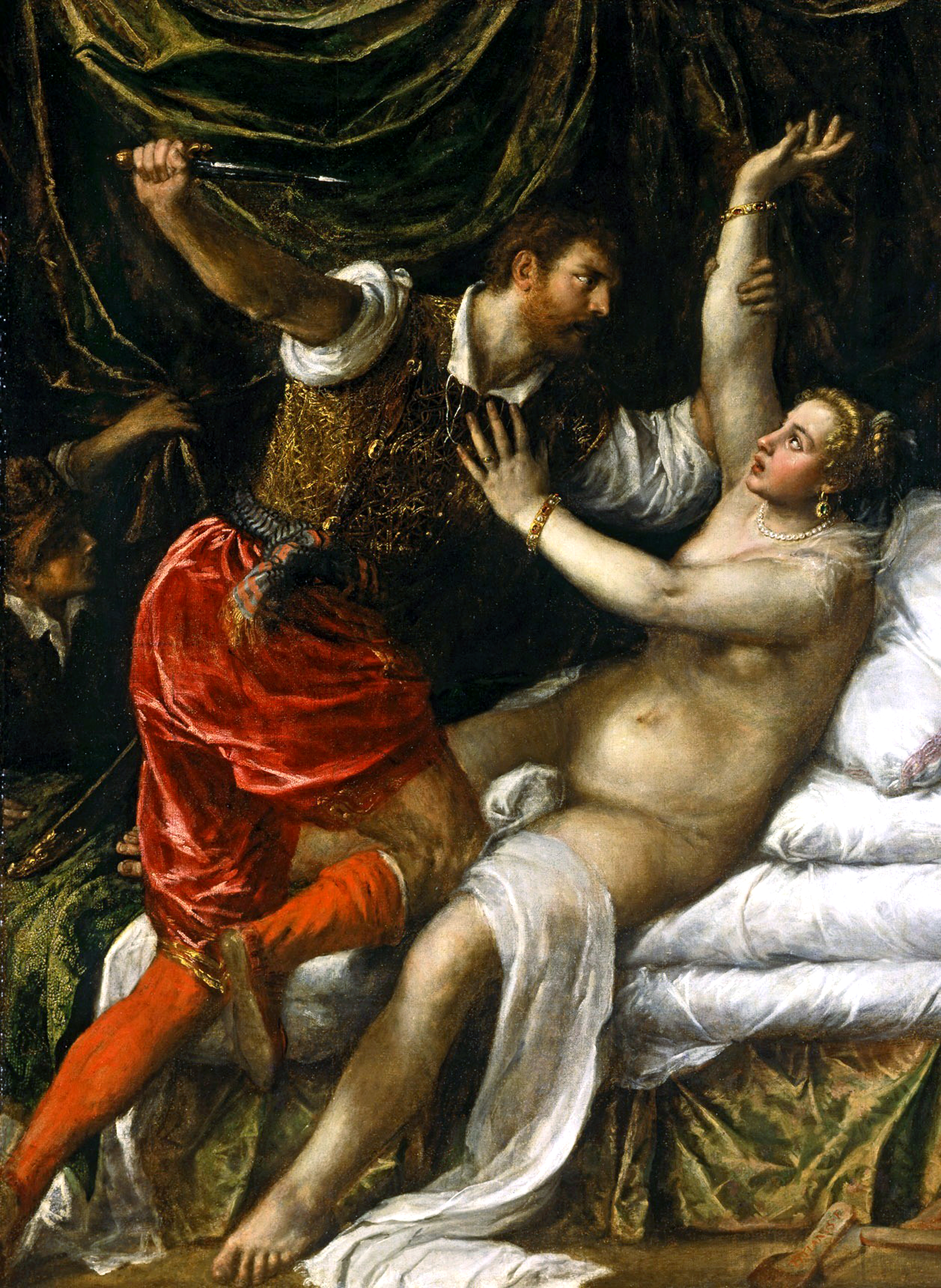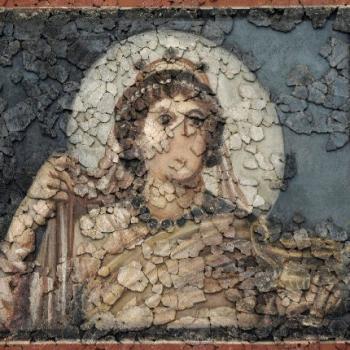The story sounds familiar in some respects. A member of the royal family, enthralled with the beauty of a married woman in his city, secretly raped her while her husband was away from the city on military campaign. In this case, however, events turned out differently than what we may remember from the Bible.

Instead of keeping the secret, the way Bathsheba did, this woman immediately summoned her father and husband, asking them also to bring witnesses. When they arrived, she told them about the rape, bemoaning the dishonor that it had brought upon her. Asking the men in her family to avenge this if they are “real men,” she promptly committed suicide, proclaiming that no woman in the future will use her as an example of tolerating such dishonor.
This horrific tale is none other than the rape of Lucretia by Sextus Tarquinius, one of the sons of the last king of Rome. It is one of the most famous episodes from the Roman historian Livy’s Ab Urbe Condita, a history of Rome from the city’s founding to the Augustan age. Reminding us that Rome can offer much to clarify Jerusalem, this narrative offers intriguing parallels to the story of Bathsheba, which yet again received significant attention on social media last month, as some questioned whether Bathsheba was actually raped, or if she was guilty of adultery along with David.
After all, the argument went, we do not hear her screaming for help. Maybe she secretly wanted to become the king’s wife, and seduced him on purpose by bathing in public, some proposed. Others noted, however, that all we get from 2 Samuel 11 is Bathsheba’s obedience to all figures of authority – just like a sheep led to slaughter. Appropriately, in the prophet Nathan’s rebuke of David, Bathsheba is represented by a poor man’s lamb, viciously slaughtered by an uncaring and greedy wealthy neighbor.
Two particularly insightful analyses resulted from this social media kerfuffle. Old Testament scholar Carmen Joy Imes convincingly explained, relying in particular on Nathan’s rebuke of David, that David alone is guilty here. Meanwhile, art historian Elissa Yukiko Weichbrodt showed the power of modern culture, which too often configures women as objects of someone’s gaze, at play even in the depictions of this episode in children’s Bibles. The ambiguity, in other words, that some might feel in wondering if Bathsheba is guilty along with David, is a product of our own cultural landscape. This extends even to children’s Bible illustrations.
But in this post, I would like to take a somewhat different approach, and consider Bathsheba alongside her Roman parallel, Lucretia. When we put the narratives of the two events side-by-side, we see that the key difference between them has to do with the presence or absence of a caring God in the narrative. Effectively, our question here is: what if God were not part of the narrative at all? What difference would this make to the pursuit of justice for the wronged, in particular? And what difference does this make for each victim’s perception of her own guilt?
In some ways, this recent debate over Bathsheba’s possible complicity in David’s crime is yet another reminder of the ways in which our own culture blinds us to the proper understanding of the past. Modern interpretations of David and Bathsheba story that claim “both are guilty” are using a modern cultural view of gender norms and relationships. The modern egalitarian presumption is that relationships involve two equal partners, and this applies to adultery as much as marriage. That was not the default cultural view of gender roles in the ancient Mediterranean world, however.
But then David and the many, many people who obey him in complicity and an elaborate cover-up scheme (and, incidentally, it is remarkable just how many people are involved in this process both in Jerusalem and in the army on campaign!), are also acting in accordance with their own cultural framework. Theirs is a framework of power and unquestioned obedience of inferiors to their Near-Eastern-style absolute monarch. That culture affected their religious observance, even as they perhaps did not realize it. Would all of those men who obeyed David first in bringing Bathsheba to him, and then by carrying out his plot to have Uriah killed in battle, have said that they believe in the Lord? Yes. Did all of them obediently and unquestioningly assist their king in breaking multiple commandments? Also, yes.
Without God, the story would have ended with the successful cover-up of the crime with more crimes, and no justice for Bathsheba or Uriah. But God did intervene, and that made all the difference. God’s intervention through the prophet Nathan provides a powerful rebuke to David, and shows the reader that Bathsheba is the victim here, and is not to blame. Yes, consequences of the sin affect her – her first son with David dies. But she is otherwise treated as a lamb — weak and powerless. And it is for the weak and powerless, as we hear repeatedly over the course of the entire Bible, that God cares the most. Justice will ultimately prevail, and it does so here as well, even if the justice seems slow to come at first.
What happened, by contrast, to Lucretia, the Roman Bathsheba? Unlike the narrative of 2 Samuel 11, where David relies on attendants to assist in perpetrating all stages of his plan, Sextus Tarquinius acts alone in the rape, without any assistants. It is also made very clear in the narrative that it is a rape – there is no room here for the kind of debate that the Bathsheba episode occasioned. Finally, the offender is very quickly brought to justice by people, not divine forces.
To pick up Livy’s narrative from the moment of Lucretia’s dramatic suicide, what happens next is revenge and revolution. Lucius Junius Brutus, who came as witness with Lucretia’s husband, picks up the bloody knife with which she killed herself, and uses it as a visual symbol to incite an aristocratic revolution against the kings.

The last king of Rome is promptly expelled from the city, elections are speedily held, and the first two consuls of what is now the Roman Republic are elected: Brutus and – believe it or not – Lucretia’s husband, Tarquinius Collatinus. The latter’s very name suggests that he too is a relative of the royal family, but it’s awkward, so Livy would rather not talk about it, thanks-so-much.
As we consider what is present in this narrative, we also need to note what is absent: there is no mention of the divine at all in this entire episode. But there is certainly a recognition of a wrong that was done, and a demand for justice. Thus, at first glance, this version of events may seem to be a striking reminder of how sometimes pagan or godless justice is more just or swift than God’s justice.
But there is more to consider. After all, while the wrongdoer is punished in the Roman story, the only person who, as far we hear, actually dies as a result of the wrongdoing is Lucretia. For while we think of her as the victim, in the Roman context it appears that even Lucretia herself was not entirely sure that she WAS the victim. If asked whether this was adultery or rape, it appears that Lucretia – and at least some Roman audiences – would not have seen the difference. And so, while demanding revenge on Tarquinius, Lucretia considers her dishonor worthy of punishment by death, a punishment that sometimes applied to adultery in the Roman world. In the Roman framework, there is no redemption left for her suffering. There can only be revenge.
As we consider how Bathsheba’s story turns out in contrast with the story of Lucretia, we see God’s care, provision, and sorrow for the hurting and the oppressed. God very much cares about justice for victims like Bathsheba, and does not overlook the disruptions of justice that sin wreaks upon the world. And, specifically, God doesn’t demand from Bathsheba the kind of horrific penalty that Lucretia exacted upon herself, because His mercy rests on all who suffer. And that makes all the difference.













